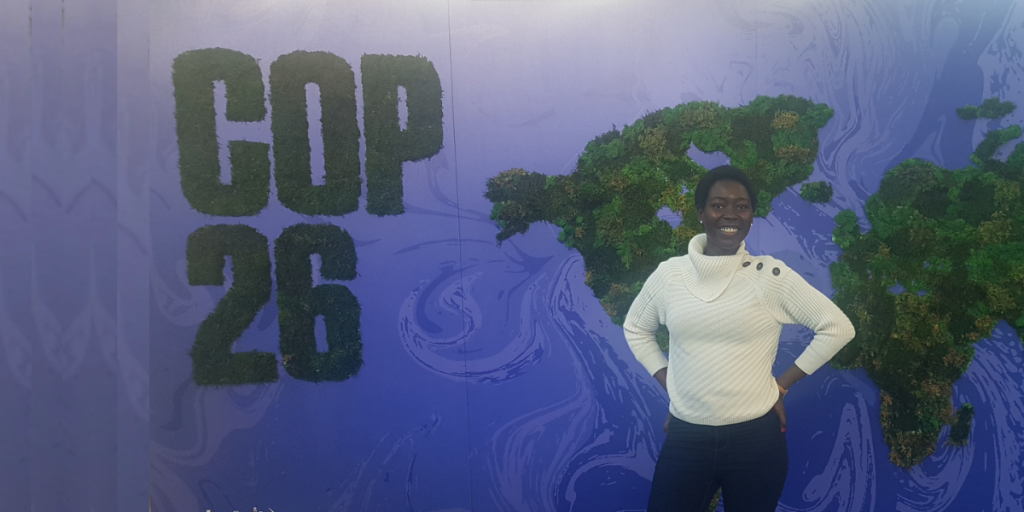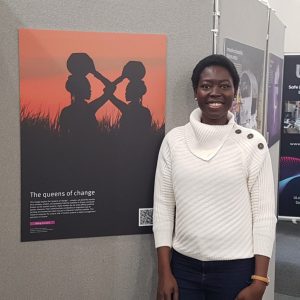Spotlight interview: Afua Owusu-Kwarteng

On 9th November 2021, RECIRCULATE Graduate Researcher and WINA Integrated Research Project Officer, Afua Owusu-Kwarteng attended the 26th United Nations Climate Change Conference (also known as COP26) in Glasgow, Scotland, United Kingdom. We asked Afua to tell us a little about the experience.
So Afua, you’re based in Lancaster and managed to plan a day trip to COP26, how was that?
It meant an early start and a long day! I left home around 5:30am in Lancaster to catch the first train to get me to Glasgow Central Station about 8.30am. From there I made my way to the Glasgow Science Centre (the location of the COP26 “Green Zone”) where the exhibitions were taking place. After taking the underground and passing through a couple of security checks I arrived at the Exhibition Centre.
What were your first impressions on entering the Green Zone of COP26?
When I got to the Exhibition Centre, I was quite excited about how well organised the place was. Although there was a lot to see on the different floors, it was also very easy for me to find my way around the different exhibition stands at the Centre. There was a display of various projects, ranging from car showcases to scientific experiments. I was offered an invitation to attend a planetarium show by the British Antarctic Survey, where I learnt how rapid climate change is impacting on walrus populations. The show ended with a panel discussion and a Q&A session on the importance of protecting the different land and aquatic species in our world. After the planetarium show, I visited the exhibition stands to get an overview of the projects and activities being undertaken by different stakeholders to tackle issues of climate change. I visited the exhibition stand of the Women and Gender Constituency, where I had a chance to learn about gender, feminism, and climate change issues based on information on their posters. In addition, I got the opportunity to talk to the team about the RECIRCULATE project and the Women Innovators Network for Africa (WINA). Although I had the chance to chat several people, the highlight of my trip to the Exhibition Centre was meeting a young Tanzanian lady who interns with a non-governmental organisation in her country. I invited her to become a WINA member and currently awaiting her response.
The COP26 activity wasn’t limited to the Green Zone though, was it?
No, in the afternoon, I left the Exhibition Centre to catch a bus to attend an event at the University of Strathclyde’s Ramshorn Theatre. Themed “The Importance of Diversity in Innovation for Tackling Climate Change” and hosted by Yewande Akinola. This programme was mainly a plenary session involving some renowned female entrepreneurs in the UK, sharing their challenges and opportunities in their business journeys. The session also included discussions around expectations for post-COP26, as well as the need to increase women’s representation and role in future COP events, especially in the area of leadership. After the event, I had the chance to talk to a few other attendees, including Yewande Akinola. In my conversation with Yewande, I spoke about RECIRCULATE, WINA, and our research on the market queens which was part of the printed exhibitions at the Ramshorn Theatre. She showed a lot of interest and support, especially as her own masters degree research had been on Tamale, in the Northern Region of Ghana. Upon my request, she asked for me to contact her in the future to discuss more about WINA and what support she could possibly provide to the network.
You mentioned the exhibition, tell us a bit more about that

Afua with her exhibit at COP26 Universities Network Climate Innovation Showcase
So, I had previously led the WP1 team to participate in the COP26 Universities Network Climate Innovation Showcase, which was hosted by the University of Strathclyde, UK. The showcase, which comprises an exhibition of climate-related research, as well as a series of events, is an initiative that was curated by the COP26 Universities Network, an informal association of academics in the UK active on subjects related to climate change, who wanted to work together in support of the aims of COP26.
As a contributor to the showcase, I capitalised on my visit to Glasgow to go and view the exhibition at The Ramshorn Theatre, where we had our research on “The Queens of Change” and other posters on display. I spent most of my remaining hours viewing climate-related research exhibitions at The Ramshorn. The University of Strathclyde team expressed their joy in having a contributor at the exhibition, and requested to take a photo of me with my poster for Twitter. I ended my day walking through the city of Glasgow to see some of the interesting COP26 themed activities in place, after which I made my return to the Glasgow Central Station at about 5.30pm to catch the train. I finally arrived at 8.50pm in Lancaster.
It was certainly a packed day! What did you take away from your insight into COP26?
Overall, my visit to Glasgow was empowering, as I got a good opportunity to understand the innovative work going on at different universities in the UK. Both the exhibition at the Ramshorn and Green Zone showcased the creativity and endeavour of researchers in developing new ways to reduce greenhouse emissions, adapting life to the changing climate, helping me to better understand the nature of the climate and its impacts, and how best to inform action through my own research project. More importantly, it allowed me to appreciate the immense efforts of RECIRCULATE’s multidisciplinary team and stakeholders who are equally working together to address the global challenges. Based on my experience at COP26, I intend to keenly follow more projects like that of the Women and Gender Constituency, to develop further understanding about the role of gender in climate change issues. I hope to use my research and the activities of the WINA network to explore some of the alternative ways in which women’s participation in sustainable development could be increased, especially regarding how women academics and entrepreneurs could work together to raise ambition for tangible outcomes to deliver a low-carbon, resilient world.
